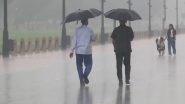Geneva [Switzerland], April 11 (ANI): As the world battles coronavirus pandemic, World Health Organisation (WHO) on Friday (local time) warned countries against hastily lifting restrictions which have been put in place to curb the spread of the virus.Addressing a press conference, WHO Director-General Tedros Adhanom Ghebreyesus said: "I know that some countries are already planning the transition out of stay-at-home restrictions. WHO wants to see restrictions lifted as much as anyone. At the same time, lifting restrictions too quickly could lead to a deadly resurgence." Tedros said WHO is working with affected countries on strategies for gradually and safely easing restrictions.He informed that globally, nearly 1.5 million confirmed cases of COVID-19 have now been reported to WHO. "In the past week, we've seen a welcome slowing in some of the hardest-hit countries in Europe, like Spain, Italy, Germany and France," said the chief of UN health body adding that at the same time, "We've seen an alarming acceleration in other countries."Expressing concern over health workers getting infected by the virus, the WHO DG said: "Every month, we will need to ship at least 100 million medical masks and gloves; up to 25 million N95 respirators, gowns and face-shields; up to 2.5 million diagnostic tests; and large quantities of oxygen concentrators and other equipment for clinical care.""To move these supplies around the world, the World Food Programme will deploy eight 747 aircraft, eight medium-sized cargo aircraft, and several smaller passenger planes to move humanitarian workers, technical staff, trainers and other personnel."Dr Michael J Ryan, WHO Executive Director said that polymerase chain reaction-based tests are "probably" the most accurate way to determine if someone is infected with COVID-19."Governments need to focus specifically on PCR based testing or any form of testing that detects active infection. In general, the PCR based tests are better for telling whether you are infected or not and Serology tests are better to detect whether you have been infected recently or in the past," he said. (ANI)
(This is an unedited and auto-generated story from Syndicated News feed, LatestLY Staff may not have modified or edited the content body)













 Quickly
Quickly





















